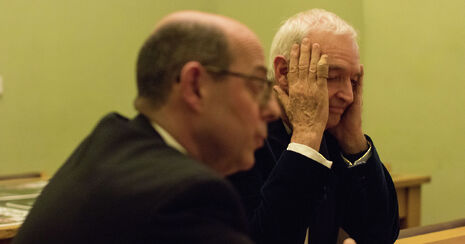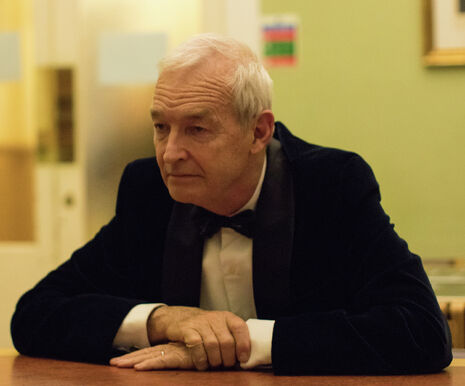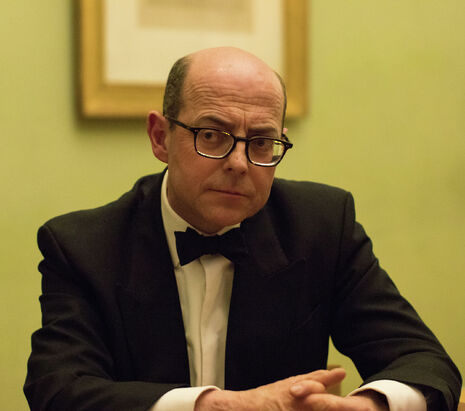Interview: Nick Robinson, Jon Snow and the search for objective truth
As journalism faces some of its toughest challenges, and the very concept of truth hangs in the balance, Anna Menin picks the brains of two legendary broadcasters

I’m in a dimly-lit room at the Union with two gagged men, both wearing black tie.
This is not quite as strange as it sounds: these men are two of the most well-known faces in British broadcast journalism. The gags? Merely figurative. Jon Snow, Channel 4 News presenter since 1989, and Nick Robinson, presenter on Radio 4’s Today programme and former BBC Political Editor, are both, in Snow’s words, “paid to have no views.”
The two men have just concluded a debate on whether ‘Westminster is dead’, forcing both to express – or at least allude to – a range of opinions. Snow, arguing for the proposition, denounced Westminster as “unfit for purpose”, while Robinson opposed, declaring it “the worst form of democracy we’ve got, apart from all the others.” And when these men say things, people tend to listen.
In the interview room afterwards, the two veteran broadcasters’ rapport is clear. They bounce off one another with a friendly joviality – Snow’s affable insouciance pairing nicely with Robinson’s stern, intellectual edge. Despite their many similarities, the two disagree on several fronts – though not on the future of their respective employers.
“I have no political friends, nobody who is an MP who is a close friend of any description.”
News anchors used to be the trusted heralds of journalistic truth. Now, with the proliferation of media brought by the internet, all this has changed. I ask if traditional news channels are in danger of losing their audiences.
“I think the opposite,” says Robinson. “People will discover how important it is that they’ve got people – particular correspondents or presenters, brands: Channel 4 News, BBC, New York Times – that they trust.”
Snow shares this optimism, but is “impressed with the speed with which certain brands like The Huffington Post, which didn’t exist before, have established themselves as reasonable sites to go and depend on.”
He is also intrigued by the “extent to which long-form journalism has had a comeback” recently. I ask about The Guardian’s recent long feature on PPE, in which it was described as the “Oxford degree that runs Britain”.
The ultimate news selfie for Action for Children & Restless Development #UNQ @aslongasittakes @restlessdev pic.twitter.com/Ut6Vu8wHfs
- Nick Robinson (@bbcnickrobinson) 20 March 2014
Robinson and Snow at a charity news quiz in March 2014
Robinson, who studied PPE at University College, Oxford, is quick to dismiss the “overstated” notion that “people are talking to their chums because they’re Oxbridge”, claiming that “hardly any” of the ministers and shadow ministers that he speaks to are people he knew at university.
“They didn’t talk to me because of that,” he stresses, “they talked to me because that’s what journalists do, and whether in health journalism, football journalism or business journalism, you have to have contacts.”
Snow, who attended the University of Liverpool but was rusticated for taking part in an anti-apartheid protest, recounts a “completely different” experience.
“I don’t know any politicians, or very, very few,” says Snow. “I have no political friends, nobody who is an MP who is a close friend of any description.
“When I speak to a politician I’m usually on air, and that’s why I speak to them,” he adds, with perhaps a hint of pride.
Yet such discussions are becoming a rarity, which Snow finds “very alarming”.
“I said ‘No, I didn’t go to Oxbridge, I went to Liverpool,’ ‘Oh,’ he said, ‘I didn’t know they had a university,’ and that’s where the conversation ended.”
“Ministers in particular are on the run. They just won’t talk. They’re not coming onto the programmes. It is, I think, a violation of an element of our democracy.” He denounces this lack of access to senior politicians as “appalling”.
“I think that they are playing fast and loose with the public.”
Robinson concurs that politicians are growing timid about media appearances. “I think they think the risks outweigh the benefits, so why go on and be interviewed by Jon who might trip you up”. “They think they’ve got alternative ways to communicate: Facebook, YouTube, for example.”
Snow chimes in, describing this as “something of an own goal”, which has lead to a drop in name recognition of senior politicians. “Nobody has any idea who half these ministers are.”
“That’s true,” echoes Robinson, as the two begin a back and forth about the state of media relationships with Westminster.
Unfortunately, at this point, the Union’s press officer decides to cut things short, 10 minutes early. Robinson and Snow, as surprised as I was, agree to continue the conversation over the phone.

Speaking to Snow two days later, we return to the Oxbridge monopoly on politics and the media. Has it affected his career?
“Absolutely, it did. When I was interviewed for my job here, many years ago, the editor of the day asked me which college I attended, and I said: ‘No, I didn’t go to Oxbridge, I went to Liverpool.’ ‘Oh,’ he said, ‘I didn’t know they had a university,’ and that’s where the conversation ended.”
I ask about Robinson’s eagerness to downplay the role of Oxbridge in public life. “I think he’s wrong,” says Snow, without hesitation.
“I think it has retreated,” he acknowledges, “and in the media in particular I think it’s been eased by the post-graduate courses at places like Cardiff and City University. But there are still Oxbridge people in key positions.”
Does he think journalism is inherently political, and should push a certain agenda? “I think journalism, at every level, actually does, one way or another.”
How does he reconcile this with being, as he puts it, paid to be a “simple objective anchor.”
“Look at George Osborne: he’s now contracted to work all these days for other people, how much time is he going put in at Parliament?”
“Well, I don't think Nick would necessarily agree, but I cannot believe that anybody who isn’t passionate about journalism isn’t, to some extent, politically motivated.
“I admit to being politically motivated. I want to see a better world,” he says, with feeling. “I want to expose what’s wrong with it, and I want to try and give a better chance to what’s right with it.
“I recognise one is supposed to be objective, and I try to be, but I think if you’ve got a choice, you’re going to go for what you feel is right.”
We return to the dysfunction Snow sees within Westminster. During the Union debate, he advocated having fewer MPs, with increased salaries, a suggestion he reiterates, arguing that their current salaries encourage them to seek “second jobs, which are absolutely unacceptable.”
“I don’t have any objections to them being paid double what they’re being paid at the moment, so long as that’s it – they don’t earn anything from anyone else,” he says. “I mean, look at George Osborne: he’s now contracted to work all these days for other people, how much time is he going put in at Parliament?”
In a remarkable twist of fate, just days later, Osborne is announced as the new editor of London’s Evening Standard. Shortly after the news breaks, I speak to Robinson, and begin by asking whether Osborne’s appointment reinforces Snow’s argument.

He begins chuckling before I’ve finished asking the question. “The truth is, I smile every time I hear Jon expressing an opinion on this because, call me old-fashioned, but my view is: I report on other people having views about these things rather than expressing my own.”
It is here than Robinson and Snow differ fundamentally: Robinson is resolute in his refusal to express opinions on the issues he covers. “Sorry to be boring, but I’m going to opt out on that – let me see if I can think of anything interesting to say to you.”
This “opt out” forces Robinson to take a broader view. He acknowledges the “howls of outrage” triggered by Osborne’s appointment, but says that there is a value in having politicians with governmental experience on the back benches.
“If people think that objective journalism is a thing of the past, well then welcome to Trump-land.”
“It seems to me the sweet spot in this argument is finding somewhere in the middle. But in the end it’s politicians’ job to find that sweet spot, not mine.”
Given how seriously he takes maintaining his journalistic objectivity, I ask if he shares Snow’s opinion that journalism is inherently political.
Robinson replies without hesitation: “No, I don’t.”
“We’re all the product of our background,” he admits, but “it is perfectly possible – and, I think, a good thing – to go to work and try to leave your opinions at the door and say ‘what is the best I can do today in trying to explain what’s going on and what’s happening?’”
“You see, the danger of saying ‘there’s no such thing as objective journalism’ is that you end up with what you’ve got in America,” he adds, his frustration evident.
“If people think that objective journalism is a thing of the past, well then welcome to Trump-land.”
He asks whether the “war between partisan broadcasters” raging in the US is truly what people want from the media, arguing that they would “regret” giving up on objectivity.
“Last thought for you,” Robinson interjects, as I begin to wind up our interview. “I’m not trying to hide behind being BBC impartiality for a reason not to express opinions on these things. I genuinely think this matters.” Robinson’s thoughts on objective journalism echo his arguments surrounding Westminster: “Far from perfect, but better than the alternative.” Certainly a pragmatic view, but one it is hard to feel roused by.
It is clearly a deeply-held conviction, though, and – in his view – the best way of achieving the fundamental aim he shares with Snow: holding people and institutions to account through their reporting.
Just before he hangs up, Robinson adds: “I hope I convinced you on objectivity. I sense I haven’t, but there we are.” He’s not entirely wrong: I remain unsure about whether journalistic objectivity is possible, but am left feeling certain that it is a worthwhile and admirable goal, now more than ever
 News / Clare Hall spent over £500k opposing busway 24 December 2025
News / Clare Hall spent over £500k opposing busway 24 December 2025 Comment / The ‘class’ of Cambridge24 December 2025
Comment / The ‘class’ of Cambridge24 December 2025 News / Caius mourns its tree-mendous loss23 December 2025
News / Caius mourns its tree-mendous loss23 December 2025 Comment / League tables do more harm than good26 December 2025
Comment / League tables do more harm than good26 December 2025 News / Girton JCR publishes open letter expressing solidarity with Palestine25 December 2025
News / Girton JCR publishes open letter expressing solidarity with Palestine25 December 2025









